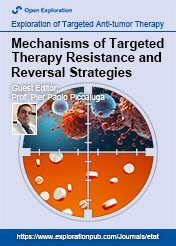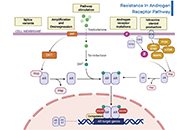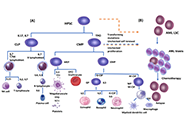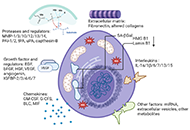
Mechanisms of Targeted Therapy Resistance and Reversal Strategies
Guest Editor
Prof. Pier Paolo Piccaluga E-Mail
Department of Experimental, Diagnostic and Specialty Medicine, University of Bologna, Bologna, Italy
Research Keywords: Leukemia, Lymphoma, hematopathology, biomarker, next generation sequencing, microarray, molecular diagnostic, targeted therapy
About the Special lssue
In the past two decades the conventional paradigm of cancer treatment, largely based on chemo- and radiotherapy has been significantly improved by the advent of the so-called targeted therapies. The first examples were trastuzumab in metastatic breast cancer (1998) and imatinib mesylate in chronic myeloid leukemia (2001); since then, several small molecules that disrupt the function of individual aberrant proteins that drive cancer progression or selectively interfere with surface antigens have been introduced and have revolutionized the practice of oncology.
The clinical benefit obtained from targeted therapies varies greatly. In fact, unfortunately, as observed with conventional chemotherapies, also target agents are affected by the occurrence of selective resistance, developed by cancer cells through different mechanisms. In patients with malignancies in which a dominant mutation, gene amplification, or translocation drives tumor growth (“oncogene addiction”), single agent-targeted therapies are highly effective but rarely curative. Examples include KIT mutations in gastrointestinal stromal tumors (GIST), epidermal growth factor receptor (EGFR) mutations in non-small cell lung cancer (NSCLC), HER2 amplification in breast cancer, and the BCR: ABL1 translocation in Philadelphia chromosome-positive leukemias. Commonly, after an initial response to targeted therapies is obtained, the majority of tumors subsequently become refractory (i.e., acquired resistance) and patients eventually succumb to disease progression.
On the other hand, in most tumors, a multiplicity of genetic alterations contributes to malignant growth, and, therefore, the benefit of targeted therapies can be modest and transient (i.e., primary resistance). Therefore, the key to the successful development and application of targeted cancer agents is a better understanding of specific mechanisms of resistance. Those usually include direct target reactivation (often throughout mutations that prevent drug binding), activation of signals upstream or downstream of oncogenes, engagement of parallel oncogenic pathways, and adaptive survival mechanisms. Illustrative examples are drawn from the same diseases for which targeted therapy has shown tremendous promise, but for which an optimal clinical success remains limited by therapeutic resistance: melanoma, non-small cell lung cancer (NSCLC), lymphomas, leukemias, breast cancer, and prostate adenocarcinoma.
In this Special Issue, Editors invite any type of contribution dealing with the mechanisms of targeted therapy resistance and reversal strategies, including original research, reviews, systematic reviews, meta-analyses, brief reports, and case reports.
Keywords: Targeted therapy; drug resistance; tyrosine kinase; oncogene addiction; cancer; monoclonal antibodies; reversal strategy
Published Articles


